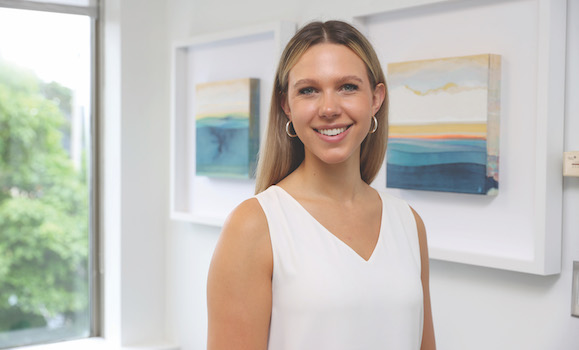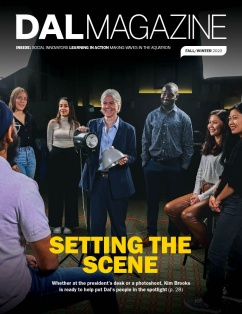On September 12, students and faculty from the Clinical Psychology PhD program and Dr. Chuck Macdonald, dean of the Faculty of Science, gathered with representatives from the Office of Addictions of Mental Health at the Fenwick Medical Centre to celebrate the grand opening of Dalhousie’s newest community clinic—the şÚÁĎłÔąĎÍřCentre for Psychological Health.
“It’s a very bright and welcoming space, and the resources needed to best serve clients are readily available. But most importantly, the clinicians involved in the centre—junior students, senior students, and supervising psychologists—create an incredible community of practice,” says clinical psychology student Jenn Leckey.
Drs. Shannon Johnson and Alissa Pencer of Dal’s Clinical Psychology PhD program had been dreaming of a community-based training clinic for some time. When the Nova Scotia government unveiled their plan for universal mental health and addictions care, they knew it was time to act. They imagined a clinic that could help support the government’s plan while enhancing the training of their students. It didn’t take long for discussions with the provincial Office of Addictions and Mental Health to develop into an exciting collaboration. The şÚÁĎłÔąĎÍřCentre for Psychological Health was the first provincial universal mental health and addictions care pilot project to launch.
“While developing the centre, we worked with the Nova Scotia Health Authority and the IWK Health Centre to identify current needs and develop a plan to supplement what they’re already doing” says Dr. Johnson, the program’s director of clinical training and co-director of the Centre for Psychological Health.
“We don’t intend to be redundant with the public system. There’s room for additional services, especially given the increased demand for mental health resources in the wake of the pandemic.”
In addition to close collaboration with government and public health, the engagement process also included psychologists from both the public and private systems, and members of a variety of community organizations—most of which will continue to partner with the centre going forward.
“We interacted with a lot of key people to get input about what’s needed, what’s missing, and what our service delivery priorities should be,” says Dr. Johnson.
The result was a mandate to serve clients with low income and to prioritize disadvantaged communities and groups including those who identify as Indigenous, African Nova Scotian, or 2SLGBTQ+; children in care or who were previously in care; and newcomers.
“The centre welcomes a diverse client population, which means we can offer excellent support to underserved client populations and enhance our learning” says Leckey. “And the range of different therapeutic approaches offered by the supervising psychologists at the clinic allows us to match the needs of clients and students.”

Jenn Lecky (Nick Pearce photo).
The Centre for Psychological Health provides assessments and offers intervention services both for individuals and groups. Students in the Clinical Psychology PhD program provide services under the supervision of registered psychologists with a wide range of expertise.
“The centre will give students a consistent start to their training before going to other placements,” explains Dr. Pencer, co-director of the centre and field placement coordinator of the Clinical Psychology PhD program. “And they can return throughout their training if they need a specific experience they can’t get elsewhere. That means our students get the experiences they need to become well-rounded clinicians who practice with a social justice lens.”
şÚÁĎłÔąĎÍřhas a rich history of community health clinics designed to support student learning while also providing access to care within the community.
It was November of 1924 when the şÚÁĎłÔąĎÍřMedical School opened the Public Health Clinic to provide services to lower-income residents of Halifax while enriching the education of medical students. Today, the Medical School continues to provide training and access to care through various clinics in communities and hospitals.
This July, Medicine’s completed its first full year of operations, welcoming 458 Indigenous patients for culturally safe and appropriate care—a number that continues to grow at a steady and sustainable rate.
Related reading:Ěý
“Our goal is to provide high-quality care,” says Dr. Brent Young, clinic lead and academic director, Indigenous health in the Department of Family Medicine. “This means allowing physicians to take more time during encounters and booking more frequent appointments to build effective therapeutic relationships with Indigenous patients. This is necessary because our patients are often experiencing ongoing colonial harms and feel mistrust when they interact with the healthcare system.”
Integration of Indigenous health into the family medicine curriculum at both the undergraduate and postgraduate level has gradually increased over recent years, and the health centre is part of that effort. By offering this learning experience, both learner and community needs are met. Now, with a year of operations under their belt, Wije’winen is opening the door to medical learners at all levels.
“The requests we have received for placements thus far have demonstrated a high degree of respect for Indigenous culture and health, and an understanding of how limited resources and opportunities should be assigned,” says Dr. Tiffany O’Donnell, physician at Wije’winen and associate professor of family medicine.
During the past year, Wije’winen also welcomed a new health director, Paulina Meader, a licensed practical nurse from Membertou First Nation. Meader has been an integral source of wisdom, knowledge, and inspiration to both the team within the centre as well as within the broader health care community.
“Paulina has been the lead on ceremony around birth and death for members of the Indigenous community within the hospital system,” says Dr. O’Donnell. “It’s left a resounding impression on the care teams involved, demonstrating the importance and impact of ceremony both as a support for patients and their families, as well as a powerful approach to decolonizing health care.
Psychiatry’s Rapid Access and Stabilization Program (RASP), which launched this past spring, is another recent addition to Medicine’s record of community support. A partnership between the Department of Psychiatry and Nova Scotia Health’s Central Zone Mental Health and Addictions Program, RASP’s goal is to ensure that no patient waits more than four weeks to see a psychiatrist in the Central Zone of Nova Scotia.
“Early intervention always equates to better prognosis,” says Dr. Vincent Agyapong, head and clinical chief of Dalhousie’s Department of Psychiatry. “The program supports family doctors by confirming a patient’s diagnosis and providing consultation on the appropriate medication to prescribe.”
Data from earlier in the year showed the program has been well received—with scores from those asked to rate their overall satisfaction of the services averaging 9.49 out of 10.
The Faculty of Dentistry has provided dental care to the public as part of its educational programs for more than 100 years. Today, Dal’s dental clinics annually support the education and training of around 190 dentistry students and 60 dental hygiene students while caring for more than 23,000 patients.
“Outreach is central to our role in the Faculty of Dentistry,” says Dr. Ben Davis, the Faculty’s dean. “That means striving to provide oral health care to our most marginalized communities and training our students to be capable and compassionate oral health-care providers, now and in their future professional lives.”
In addition to the recently renovated, 50,000-square- foot Dr. William Murphy Dental Clinic on campus, the faculty also runs three permanent outreach clinics, including the North End Community Health Centre (NECHC) dental clinic, where dentistry and dental hygiene students have an opportunity to learn the complexities of supporting community members who are experiencing barriers to adequate care.
Related reading:ĚýRevitalized Dal dental clinic officially opensĚý(Dal News, 2018)
Anna Quon (BA’89) a self-described Mad, mixed-race poet and novelist, is one of the NECHC dental clinic’s regular clients. The first two stanzas of her poem, “In Support of a Guaranteed Basic Income,” (right/below) highlight how meaningful adequate dental care can be for people experiencing poverty.
In November 2022, Quon won The Launch, Lunenburg Doc Fest’s documentary pitch contest for underrepresented filmmakers. The $20,000 prize package of cash and in-kind support was used used to help Quon develop a film calledĚýMe and My Teeth, which explores her interaction with the NECHC dental clinic—one of the settings—and highlights the parallels between dental and mental health. The film was launched at Lunenburg Doc Fest on September 23, 2023.
The soon-to-open Tze/Chiang Paediatric and Adult Special Needs Clinic is one of the Faculty of Dentistry’s newest community initiatives. It will support access to care for patients with medical diagnoses or behavioral challenges and provide a learning opportunity that extends beyond current needs.
Read more:ĚýDal alum’s $1‑million gift to create paediatric and adult special needs dental clinicĚý(Dal News, 2022)
“Without question, access to oral health care for children, adolescents, and teens with medical diagnoses or behavioural challenges is limited—even regular checkups and fluoride treatments can be challenging for patients, caregivers, and dental treatment providers alike,” says Dr. Evan Shaw, an assistant professor in the paediatric dentistry division.
By giving students a chance to gain the experience and confidence needed to provide routine and preventive care to special needs patients, it is hoped they will feel empowered to continue to do so throughout their professional careers.
When the School of Social Work Community Clinic opened its doors in June 2014, it was one of the first in North America to feature the dual mandate of providing social services to underserved populations while offering community-level learning opportunities for social work students.
“We wanted a place where students could come and learn from clients in real-life situations while being supervised by social workers,” explains Cyndi Hall, clinic director and field education coordinator in the School of Social Work. “And we wanted it to be interdisciplinary, with many allied professions working together in community. That’s a unique approach for a School of Social Work. Usually, the closest students get to that experience is in the hospital setting, which has a very different dynamic than being in community and learning from each other and having the time to follow through.”
The clinic now serves a caseload of more than 200 community members and has provided field placement experiences for at least six Bachelor of Social Work and about five Master of Social Work students each year. They also welcome pharmacy, psychology, nutrition, nursing, and occupational therapy students.
“It’s always been very intentional—the dynamics of how we bring other disciplines into the clinic,” says Jeff Karabanow, clinic director and professor in the School of Social Work. “A: We want to be able to provide meaningful services. B: We also want to be able to provide thoughtful, meaningful student practicums. Those are aligned so deeply because we are very strategic about how we can deliver that.” The clinic has a long-standing partnership with şÚÁĎłÔąĎÍřLegal Aid, another of Dal’s community-based programs, and the new Centre for Psychological Health chose to set up shop in the Fenwick Medical Center, where the Social Work Clinic is also found, because they expect to be able to work together to support community members and student learning.
Examples like these demonstrate how şÚÁĎłÔąĎÍřclinics can work together to offer interdisciplinary learning while also providing more holistic health and wellness options in the community. With such a variety of new and established clinics across the university, there’s work underway to understand how the clinics might work even more closely in the future to enable interdisciplinary student learning opportunities and support user experience across multiple clinics.
Ěý
Read more:ĚýDal and Nova Scotia launch Centre for Psychological Health for vulnerable populationsĚý(Dal News)
This story appeared in theĚýDAL Magazine Fall/Winter 2023Ěýissue. Flip through the rest of the issue using the links below.



